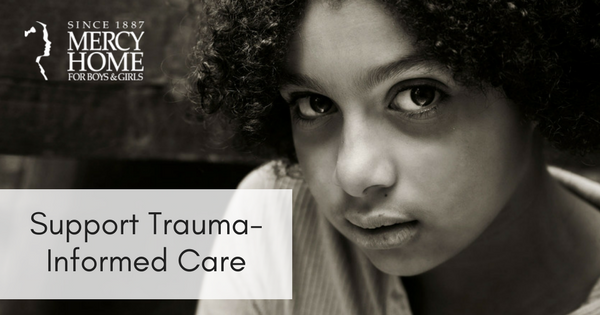Mercy Home Earns Tribune’s Top Workplaces Honor for 8th Straight Year
Mercy Home for Boys & Girls was again named among the top 100 places to work in Chicagoland by the...
November 8, 2019
July 13, 2017
Mark Schmeltzer, Director of Communications

CHICAGO, July 11, 2017—Mercy Home for Boys & Girls is urging the public to support legislation introduced in both houses of Congress that would help front-line professionals recognize and respond to psychological trauma in children and teens. In the end, such an intensified national effort can reduce the violence that plagues too many communities by addressing its root causes.
The Trauma-Informed Care for Children and Families Act of 2017 will help teachers, doctors, social-service providers, first responders, and others better assist children who have experienced trauma and toxic stress as a result of their exposure to violence, domestic abuse, neglect, or poverty.
Today, we understand more than ever about the long-term impact of trauma and stress on a child’s developing brain, health, and life chances. Further, we have a greater awareness today of the relationship between childhood trauma and the perpetuation of cycles of violence. A 2004 study of youth in the Cook County Juvenile Detention Center, for example, showed that 92% had experienced trauma.
Traumatic experiences can severely impact concentration, self-regulation, behavior, and even physical health. And yet many people who have daily contact with affected children can only see the symptoms of these experiences and not the underlying trauma. The Trauma-Informed Care for Children and Families Act of 2017 is an opportunity to confront the problem at its source by providing federal support for those who work directly with children and families. Properly supported, these professionals will be a critical force in breaking the cycle of violence in our communities and which will, in turn, reduce its devastating impact on a generation.
Based in Chicago, Mercy Home for Boys & Girls works directly with children who struggle with the persistent psychological and physiological effects of trauma wrought by exposure to violence, abuse, and neglect. The Home’s clinical director Emily Neal describes how she and her colleagues are informed in their approach to treatment by relatively recent scientific evidence of altered brain functioning caused by traumatic early experiences. Where practitioners once used psychological, emotional, and behavioral terms to diagnose the effects of trauma, Neal said, “there’s been a shift from ‘what’s wrong with you to what’s happened to you?’ I think this really sums up what trauma-informed care is all about,” said Neal.
Mercy Home has built its current model of child care on a framework called ARC, which stands for Attachment, Regulation, and Competency, and was developed by the Trauma Center at Justice Resource Institute of Massachusetts. Neal and coworker Jeremy Karpen are now trained and credentialed to consult with youth care agencies across the country to help them apply the ARC framework. In addition, Mercy Home staff is training educators in several Chicago schools on how to recognize the signs of trauma in students.
“We can only care for so many children within our walls,” said Rev. L. Scott Donahue, Mercy Home’s President and CEO. “But we want to do everything we can with the resources and expertise we have to help more children. This bill meets the kids where they’re at by making sure that those who work with them on a daily basis are equipped to understand and respond to their needs.”
Visitors to Mercy Home’s website. They are also urged to urge others to add their voices as well.
The proposed legislation will place a national spotlight on the hidden effects of violence and trauma while providing better coordination of services to change the trajectory of children’s lives.
According to the bill’s sponsors, it will:
Learn more about the Trauma Informed Care for Children and Families Act (H.R. 1757/ S.774) and go to MercyHome.org to add your voice today—urge your Representative to support this bill and bring it to the floor.
About Mercy Home for Boys & Girls
Mercy Home for Boys & Girls has been a solution for kids in crisis since 1887. Through its residential, aftercare, and mentoring programs, Mercy Home offers a safe home, emotional healing, education, and life-changing opportunities for more than 600 young people every year. It gives children who have suffered abuse, neglect, poverty and even abandonment the therapeutic, academic and vocational support they need to heal from the traumas of their pasts and build success for their futures. Mercy Home is 99.9% privately funded and operates at three locations in Chicago – a home for boys in the West Loop neighborhood, a home for girls in Beverly, and a home for AfterCare residents in South Shore.
*******
Mercy Home for Boys & Girls was again named among the top 100 places to work in Chicagoland by the...
November 8, 2019
Mercy Home names Emily Neal as the new Vice President of Organizational Development.
September 16, 2019
Fr. Scott Donahue, President and CEO of Mercy Home for Boys & Girls, was inducted into the Irish American Hall...
February 2, 2019
This is great news! Being aware and informed on trauma and how to better work with people who have experienced trauma is truly some of the most important work being done in the world today. Thank you for your cutting edge work on this and for promoting the legislation!